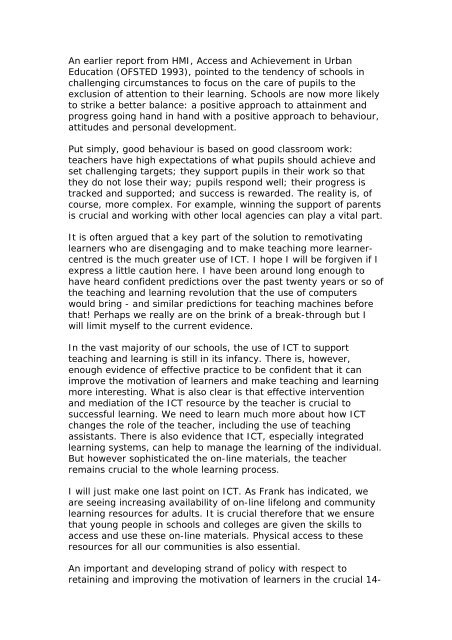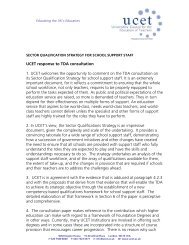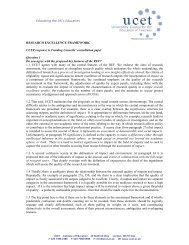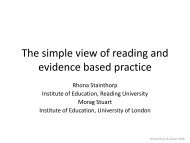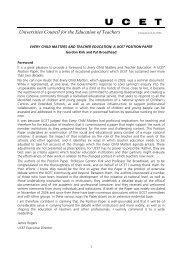The School Curriculum Ten Years Hence - UCET: Universities ...
The School Curriculum Ten Years Hence - UCET: Universities ...
The School Curriculum Ten Years Hence - UCET: Universities ...
You also want an ePaper? Increase the reach of your titles
YUMPU automatically turns print PDFs into web optimized ePapers that Google loves.
An earlier report from HMI, Access and Achievement in Urban<br />
Education (OFSTED 1993), pointed to the tendency of schools in<br />
challenging circumstances to focus on the care of pupils to the<br />
exclusion of attention to their learning. <strong>School</strong>s are now more likely<br />
to strike a better balance: a positive approach to attainment and<br />
progress going hand in hand with a positive approach to behaviour,<br />
attitudes and personal development.<br />
Put simply, good behaviour is based on good classroom work:<br />
teachers have high expectations of what pupils should achieve and<br />
set challenging targets; they support pupils in their work so that<br />
they do not lose their way; pupils respond well; their progress is<br />
tracked and supported; and success is rewarded. <strong>The</strong> reality is, of<br />
course, more complex. For example, winning the support of parents<br />
is crucial and working with other local agencies can play a vital part.<br />
It is often argued that a key part of the solution to remotivating<br />
learners who are disengaging and to make teaching more learnercentred<br />
is the much greater use of ICT. I hope I will be forgiven if I<br />
express a little caution here. I have been around long enough to<br />
have heard confident predictions over the past twenty years or so of<br />
the teaching and learning revolution that the use of computers<br />
would bring - and similar predictions for teaching machines before<br />
that! Perhaps we really are on the brink of a break-through but I<br />
will limit myself to the current evidence.<br />
In the vast majority of our schools, the use of ICT to support<br />
teaching and learning is still in its infancy. <strong>The</strong>re is, however,<br />
enough evidence of effective practice to be confident that it can<br />
improve the motivation of learners and make teaching and learning<br />
more interesting. What is also clear is that effective intervention<br />
and mediation of the ICT resource by the teacher is crucial to<br />
successful learning. We need to learn much more about how ICT<br />
changes the role of the teacher, including the use of teaching<br />
assistants. <strong>The</strong>re is also evidence that ICT, especially integrated<br />
learning systems, can help to manage the learning of the individual.<br />
But however sophisticated the on-line materials, the teacher<br />
remains crucial to the whole learning process.<br />
I will just make one last point on ICT. As Frank has indicated, we<br />
are seeing increasing availability of on-line lifelong and community<br />
learning resources for adults. It is crucial therefore that we ensure<br />
that young people in schools and colleges are given the skills to<br />
access and use these on-line materials. Physical access to these<br />
resources for all our communities is also essential.<br />
An important and developing strand of policy with respect to<br />
retaining and improving the motivation of learners in the crucial 14-


